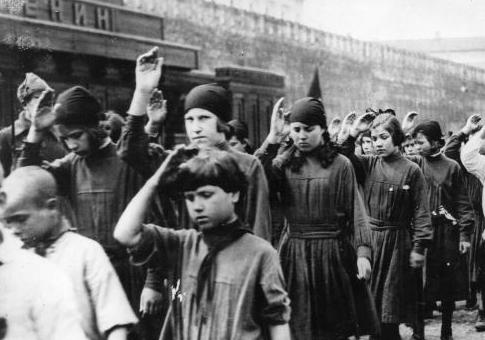MIT Press is out with a new book that teaches children the tenets of Karl Marx with fairy tales.
Communism for Kids, written by a German author who specializes in political theory and "queer politics," was released last month. The thesis of the children's book is that communism is "not that hard," but has not been implemented in the right way.
"Once upon a time, people yearned to be free of the misery of capitalism. How could their dreams come true?" a plot synopsis for the book reads. "This little book proposes a different kind of communism, one that is true to its ideals and free from authoritarianism."
The book is full of cartoon drawings of "lovable little revolutionaries" that help navigate kids through the "evils" of capitalism.
"Offering relief for many who have been numbed by Marxist exegesis and given headaches by the earnest pompousness of socialist politics, it presents political theory in the simple terms of a children's story, accompanied by illustrations of lovable little revolutionaries experiencing their political awakening," MIT Press states.
"It all unfolds like a story, with jealous princesses, fancy swords, displaced peasants, mean bosses, and tired workers—not to mention a Ouija board, a talking chair, and a big pot called 'the state,'" the plot description continues.
"Before they know it, readers are learning about the economic history of feudalism, class struggles in capitalism, different ideas of communism, and more," MIT Press notes.
The book lays out various approaches to communism, all of which fail. However, Communism for Kids ends with the message that class warfare could still lead to a "better world."
"Finally, competition between two factories leads to a crisis that the workers attempt to solve in six different ways (most of them borrowed from historic models of communist or socialist change)," the description states. "Each attempt fails, since true communism is not so easy after all. But it's also not that hard."
"At last, the people take everything into their own hands and decide for themselves how to continue," MIT Press concludes. "Happy ending? Only the future will tell. With an epilogue that goes deeper into the theoretical issues behind the story, this book is perfect for all ages and all who desire a better world."
The book is selling for $12.95.
MIT Press translated the book from German author Bini Adamczak, a "social theorist and artist" who writes on "political theory, queer politics, and the past future of revolutions." MIT Press did not immediately return request for comment on why it chose to publish the book.
MIT Press says its list of published books is "based in science and technology," and it works to publish "significant works by pioneering international authors."
The book has received rave reviews from Rachel Kushner, a novelist who uses revolutionary themes and "scares male critics," according to Salon.com. Kushner says the book is especially needed now, since Donald Trump won the presidency.
"Communism for Kids, by Bini Adamczak, is in fact for everyone, an inspired and necessary book especially now, a moment when people feel that we are on the verge of the destruction of the world, and without any new world to hope for, or believe in," Kushner says. "Have two hundred years of capitalism brought us freedom? Or just more inequality than has ever been experienced by humans on earth?"
"Global capitalism is not human destiny, it merely is," Kushner adds. "To think beyond it, with the help of Adamczak’s primer, is to take a first step toward freedom, at least the freedom to imagine other worlds."
Fredric R. Jameson, a professor of romance studies at Duke University who has "done more than any contemporary intellectual to rethink and renew the tradition of Marxist cultural theory," also praised the book as great for kids.
"This delightful little book may be helpful in showing youngsters there are other forms of life and living than the one we currently 'enjoy'; and even some adults might learn from it as well," Jameson says. "At a time when our younger generations are not only dissatisfied but active enough to have some new thoughts of their own and to look around seriously for alternatives, political pedagogy has a real function and might well, as here, be reinvented in new ways."
Chapter titles for the 101-page book include: "What is communism?" "What is capitalism?" "How did capitalism arise?" "What is work?" "What is the market?" "What is crisis?" and "What is to be done?"
The epilogue is entitled "Communist desire."
The book is currently the number one new release in the "Communism and Socialism" category on Amazon.
Some reviewers have pointed out the book's poor writing, while others say it "makes marxism cool again!"
"Who wrote this junk?" asked one person who reviewed the book. "Not that there's anything wrong with a little Marxist education for the kiddies. And the pictures are cute. But the writing! So circular and scattered and verbose, it's hard to make sense of it. I don't know who's to blame—author or translators. But junior Communists deserve better than this, unfortunately."
A portion of the first chapter is available online, offering insight into the tone of the book.
"Communism names the society that gets rid of all the evils people suffer today in our society under capitalism," the first chapter begins. "There are lots of different ideas about what communism should look like. But if communism means getting rid of all the evils people suffer under capitalism, then the best kind of communism is the one that can get rid of the most evils."
The first chapter argues communism is a "good remedy," but is not a "cure-all" for the "evils caused by capitalism."
"To really understand communism and figure out which idea of it is the best, we have to first understand capitalism and how it makes people suffer," the chapter concludes.
Communist regimes have killed approximately 100 million people over the past century.
